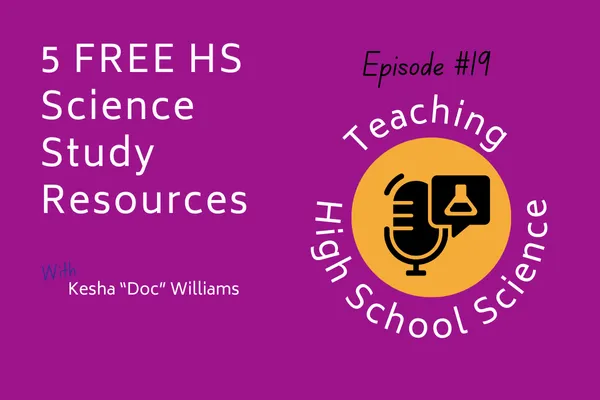On The Pod
I want to hear from you!
Join the dialog and share your comments, experiences, and questions by visiting the Facebook link in each Podcast!

E19 5 Free Study Resources for High School Science
In this episode of Teaching High School Science, I’m breaking down my top five free study resources that will help your teen excel in science—without breaking the bank! Whether you're homeschooling your teen or supporting them in traditional school, these tools are game-changers for mastering science concepts. Tune in as I share resources that are both powerful and accessible, designed to help your teen succeed in subjects like chemistry, biology, and physics.
Key Concepts Covered:
Khan Academy: Full curriculum with interactive practice problems. Perfect for reinforcing topics like stoichiometry or genetics.
YouTube Channels:
CrashCourse Kids: Fun, engaging science content for middle schoolers.
Amoeba Sisters: Animated help with biology
Melissa Maribel: Excellent resource for chemistry help.
Tyler DeWitt: Simple, clear explanations for chemistry concepts.
Bozeman Science: Covers biology, chemistry, and physics with engaging content.
Professor Dave: Offers tutorials across physics, chemistry, and more.
The Organic Chemistry Tutor: Breaks down multiple subjects, including chemistry and math, in an easy-to-understand format.
Quizlet: The ultimate online flashcard tool that helps with memorization and quiz prep, perfect for vocabulary-heavy science topics.
PhET Interactive Simulations: Free, interactive simulations for exploring science concepts in real-time. Great for visual learners who need help understanding molecular structures or physics.
OpenStax: Free, high-quality textbooks for students needing comprehensive science references.
CK-12.org: Another excellent resource for interactive textbooks and science simulations.
Useful Links:
Pick a couple of these resources that fit your teen’s learning style, and give them a try! Whether it's interactive flashcards, practice quizzes, or high-quality simulations, you’re setting your teen up for success. If you’re looking for more personalized help, I still have a few slots open for 1-on-1 tutoring through OutSchool. Head to my website for more details!
All Rights Reserved 2023 - (C) TheScienceMentor.com -TM | Terms & Conditions | Privacy Policy | Disclaimers
